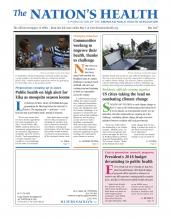When physicians perceive high expectations from patients to prescribe antibiotics they may be more likely to give in to their requests — even when physicians think that prescribing antibiotics would be ineffective.
A study published in Health Psychology in February highlighted the role that patients and physicians play in contributing to potentially dangerous antibiotic prescribing practices, and in effect, the growing threat of antibiotic resistance.
According to the World Health Organization, antibiotic resistance is an urgent global public health issue. Overprescribing antibiotics is exacerbating the problem, making communities more vulnerable to threats such as antibiotic-resistant superbugs. In outpatient settings, at least 30 percent of antibiotics courses prescribed are unnecessary, according to the Centers for Disease Control.
“We have shown causal evidence that nonclinical factors such as antibiotics expectations of patients might alter prescribing of antibiotics,” lead study author Miroslav Sirota, PhD, MSc, lecturer in the Department of Psychology at the University of Essex in England, told The Nation’s Health.
Hopefully, he said, the research will result in “better understanding of psychological mechanisms of overprescribing and deepen our contribution to antibiotics stewardship.”
Nonclinical factors that lead to overprescribing antibiotics include physicians’ uncertainty in making diagnostic decisions, patients’ expectations regarding antibiotics and physicians’ assumptions about patient expectations. Patients may also have an unrealistic view of the effectiveness of antibiotics or falsely believe that being prescribed more antibiotics will result in better health outcomes.
For the study, a group of 436 physicians in the U.K. took part in two experiments with hypothetical situations involving patients with either high or low expectations for antibiotics.
In the first experiment, physicians read one of several vignettes about a 15-year-old girl with an ear infection accompanied by her mother. In the high-expectation scenario, the mother stressed her daughter’s need to recover in time for an upcoming swim meet. In the low-expectation scenario, there was no upcoming swim meet. Physicians overall said they would prescribe antibiotics to in the scenario in which the mother had higher expectations for antibiotics being prescribed for her daughter.
In the second experiment, physicians read about an adult patient with symptoms of an ear infection, similarly providing their responses to the patient with either high or low expectations for antibiotics. Slightly more than half of the participants said they would prescribe antibiotics. Also, physicians had a greater likelihood of prescribing antibiotics if the patient expressed expectations for antibiotics during the consultation. However, just 12 percent of physicians said they would prescribe antibiotics to an adult patient with cold symptoms who expressed high expectations for antibiotics.
To curb overprescribing antibiotics, the study called for interventions focused on nonclinical factors and social influences, including patients’ expectations, physicians’ assumptions about patient expectations and physicians’ ability to handle such expectations. Interventions are most successful when conducted between patients and clinicians during consultations, it said.
“Different aspects of high expectations for antibiotics can be tackled in different interventions,” Sirota said. “For instance, family physicians could be trained more in communication skills, e.g., assertiveness, to be able to resist the pressure or to clarify the expectations of parents, e.g., a parent can revisit a physician to seek reassurance that his or her child is OK, which could be misinterpreted as seeking a prescription and patients could be involved in discussions of possible harms via shared decision-making.”
CDC’s Get Smart Campaign, www.cdc.gov/getsmart, has free tools for health care workers to use when talking about antibiotics, including handouts and posters.
For more information, visit http://www.apa.org/pubs/journals/releases/hea-hea0000456.pdf.
- Copyright The Nation’s Health, American Public Health Association









